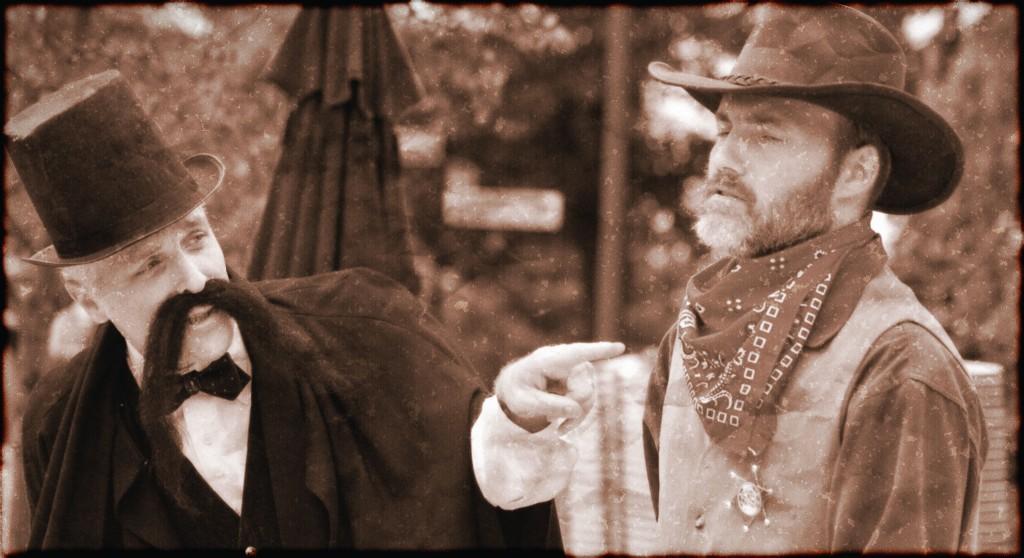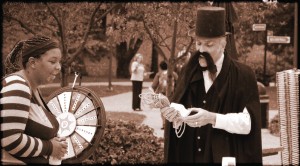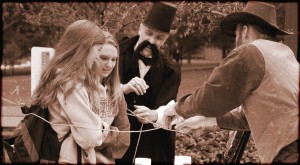
As the schedule of classes became available for spring semester, advisers saddled up and reined in students during the Wild, Wild Week of Advising.
The third annual Advising Week took place from Sept. 24-27 and featured a western appearance, where students were able to find out information about classes, when registration appointments started and the importance of advising.
Christina Thompson, academic adviser for the Advising Center for Exploratory Students, said advisers are the best resources and advocates on campus for students.
“Our advisers are very outgoing and energetic people and have no problems stopping students on their way out of class or on their way to class,” Thompson said.
One of the main events throughout the week included the Showdown at the IU Southeast Corral, which was set up in McCullough Plaza during the lunch hour. Students spun a wheel of four different categories with questions pertaining to advising, including people, places, policies and procedures. If they answered the question correctly, they won a free prize and lunch.
Shane Thomas, adviser for ACES, who played the role of “Cowboy Justice,” and Jay McTyier, program analyst for the Registrar, who performed as “Snidely Whiplash,” manned the game show booth.

Thomas said the western theme was chosen based off a consensus from the Advising Week Planning Committee.
“Advising can get pretty wild at times, and your future can be pretty wild if you don’t see them about it,” Thomas said.
Some of the other events included group advising sessions and a panel of students who discussed how they chose their majors. Thompson said the number of appointments scheduled increased during the week.
Katie McMillin, business senior, said she thought this year’s theme was fun because it caught her attention. She also said advising is important in order to make sure students are taking the classes they need.
“I’ve changed my major a lot, so advising has helped me because I don’t really know what classes I had to take when I changed my major,” McMillin said.
Capricia Grady, undecided sophomore, also participated in the Showdown event and said advising helps students go in the right direction.
“They basically pick my classes for me,” she said. “I don’t know how to do it, so they really have done a lot and told me what I should take and what I shouldn’t.”
Due to reforms on education with retention and persistence, one advising change involved advising pre-major students in the various schools as soon as they begin at the university. Annette Wyandotte, associate vice chancellor of Academic Affairs, said this allows students to identify with advisers and faculty sooner.
Another change that came about was ACES, which focuses only on students who have not decided on a major yet.
Mandatory advising is also required for undecided students.
Wyandotte said advising is a way to assure students will not spend extra time in school for mistakes.
“It belongs to all the students, and if they’re not using it, they’re not getting their money’s worth,” she said.

Thomas said the main concerns students have when being advised are classes being closed and class scheduling.
In knowing what classes to take, paying for school and balancing classes with family, Thompson said these are areas where advisers also try to help students.
“I think all students usually have some kind of question or area they need help, whether it’s finding their major or kind of developing that plan while they’re in school, to be best prepared for a job,” she said.
Batbileg Battogtokh, international business freshman, said advisers were able to help him select a class when he had trouble finding one.
“They help you keep on track,” Battogtokh said.
Robyn Stumler, business freshman, also said she had difficulty in the past selecting which major she wanted to pursue.
“I wasn’t for sure if I wanted to do business, so she put me in classes that could be used for business or other majors,” Stumler said.
Another concern McTyier highlighted is students not knowing what to major in because of fear and uncertainty of available jobs in that career track.
“Something my mom told me was ‘Do what you love, and the money will follow,’ and I really wish that students would accept that because, if you’re really passionate, you’re going to take that passion, not here at school, but to whatever job you’re going to take,” he said.
Despite these concerns, Thompson said students should not be afraid to meet with their advisers.
“We have open doors for a reason, and we just want them to be successful and get what they want and need out of their education,” she said.
By CLAIRE MUNN
Senior Editor
clamunn@umail.iu.edu
[photospace]


